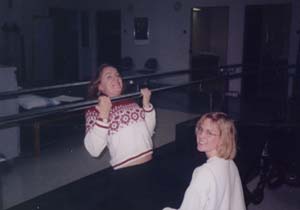

|
Learning To Walk Again
[FEB. 5 2000] Jodi Higgins loves to swim. With a swimming scholarship to Lincoln College, she competes regularly in the 50- and 100-yard freestyle. When she is not in the pool, she can be found participating in 5K road races and working out at least two days during the week. But her regular workouts aren’t just for looks. She is tackling her most challenging sport yet—learning to walk again. |
|
|
At
19, Jodi is a typical college student. Despite a car
accident in September 1998 that left her paralyzed from
the waist down, she looks to her future with a positive
attitude and much enthusiasm. She is tackling a
course-load of seven classes this semester and plans to
graduate in May. Following graduation, she will continue
her education at Aurora University near Chicago, pursuing
a degree in recreational therapy.
But, she finds some of her biggest challenges are not in
her studies, but in her daily routine. “It’s been
hard,” she says. “I’ve had to learn to do everything
over again.” Activities
such as bathing and dressing, for example, became a 1 ½-hour
process every morning. And once she was ready for the day,
getting to class was no simple task, either.
“I used to be the type of person who would wake
up 10 minutes before class,” she explains. “But [after
the accident], it would take me 25 minutes just to go a
short distance.” Jodi says that making the decision to come back to school was difficult because she was afraid of how her classmates would react. “I was afraid of people not accepting me. I was very self-conscious,” she says. She explains that during the first few months after her return to school, she had the fear of falling. Keeping her balance was hard, and several times she fell and did not yet have the strength to pull herself back into her chair.
[Jodi Higgins does chin-ups with therapist Stephanie Veigen at Decatur Memorial Hospital.] |
To tackle that difficulty, as well as others, Jodi attends
physical and occupational therapy regularly. She practices
balance, range-of-motion and strengthening exercises. The
therapy has helped her improve her upper body and grip
strength, which is what she uses for swimming and other
daily activities. She says swimming is one thing that has
“kept her going.”
Two months after the accident, she was back in the
pool. “I wanted to swim again,” she says. Now she
swims one hour every evening and competes at all home swim
meets.
Next week, Jodi will begin the next phase in working
toward one of her goals. She will begin therapy with leg
braces to help strengthen her legs for a chance at walking
again. And, it is obvious that walking is not the only
thing she has in mind. “I told my neurosurgeon, ‘I can
run in these things now, right?’”
Many aspects of adjusting to her paralysis have been
tough, but Jodi says that she thinks the hardest thing is
simply coping. That is part of the reason behind her
decision to pursue recreational therapy, with the hopes of
having her own rehabilitation clinic that specializes in
spinal injuries. She
explains that it will be, “a place where they can go if
they need someone to talk to and work with [a therapist]
that understands.”
Jodi says that much of her support and understanding has
come from her parents. “They were [at the hospital]
every night. They never left me,” she explains. She adds
that they have also given her much encouragement. “They
set goals for me and they pushed me,” she says. |
|
Local hair stylist celebrates 36 years [FEB. 2, 2000] Curly or straight, short or long, Jane Horchem has seen and styled it all. Today she celebrates 36 years as hair stylist, business owner and friend to many Lincoln residents who visit her beauty shop, Jane’s Fashion Kurl, located at 452 Eighth Street.
|
|
|
But this isn’t your typical salon. When you walk into her shop, you are walking into a home. "I’ve made a lot of friendships," she explains. "We’ve cried together and laughed together." When she started her business in 1964, she was working out of her kitchen. "I wanted to be home when my kids came home," she says. After a couple months, she converted her basement into her beauty salon, and she has been there ever since. "When I started I had a lot of people tell me it wouldn’t work because it was in my house," she explains, "but it was quite the opposite." Mrs. Horchem attributes her success to many factors, including the loyalty of her customers and the constant support of her husband Morris. Also, she regularly attends seminars in order to stay current on the latest trends and techniques. "I do very little advertising. It’s mostly been word-of-mouth," she says. The long-term success of her business, though, is a result of hard work. Her 8- to 10-hour work day sometimes starts as early as 6:30 in the morning because she always tries to work around her clients’ schedule. Her clientele, both men and women, range in age from 5 years old to 87 years old, which makes versatility important. Throughout the day, she performs a variety of "beauty tasks," such as coloring, perms, and cut and style.
But her clients will tell you that it is more than just getting their hair styled. "She cares very much," says one of her loyal customers. "Plus, you can always get a good cup of coffee, because my husband makes it," she adds, laughing.
|
Despite long, and sometimes odd hours, Mrs. Horchem enjoys her work. She explains that she likes to make a difference in someone’s day. "Sometimes someone will come in feeling down, but when they leave they are smiling." To put it simply, "I like people," she says. Over the years, Mrs. Horchem has styled a lot of hair for a lot of clients. Now, one of those clients, Paula Landess, works with her as a stylist. "She used to work as my shampoo girl in high school," Mrs. Horchem explains. "It’s nice to be able to work with her." When she is not in her shop cutting, curling or styling hair, Mrs. Horchem avidly quilts and sews. She adds that having her business at home made it easier to be involved with her children’s activities at church and school. Her two children are now grown and she has three grandchildren, and she is very glad to have had to opportunity to work at home and be available for her children and husband. "I’d do it again," she says. This family-focused attitude is certainly reflected in her work. "We’re family people," she says. "You are not only their hairdresser, you become friends."
|


